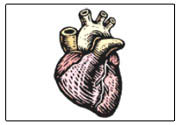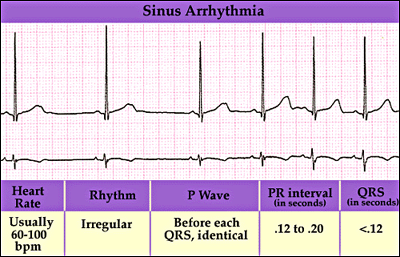Health Topic: Arrhythmia

Definition
An arrhythmia is any disorder of heart rate or rhythm.
Causes, incidence, and risk factors
Arrhythmias are caused by a disruption of the normal electrical
conduction system of the heart. Normally, the 4 chambers of the
heart (2 atria and 2 ventricles) contract in a very specific, coordinated
manner. When the heart beats faster than normal, it is called tachycardia.
Bradycardia is a slower-than-normal rhythm.
Problems can occur anywhere along the conduction system, causing
various arrhythmias. Electrical impulses signal the heart to contract
in a synchronized manner. There may be a problem in the heart muscle
itself, causing it to respond differently to the signal, or causing
the ventricles to contract independently of the normal conduction
system.
Tachycardia that originates in the atria is called supraventricular
tachycardia, and ventricular tachycardia when it originates in the
ventricles. The most common supraventricular tachycardias are atrial
fibrillation, atrial flutter, and atrioventricular nodal reentry
tachycardia.
Bradycardia is due either to altered pacemaker function
of the sinoatrial node or an interrupted impulse conduction through
the natural electrical pathways of the heart.
Arrhythmias may also be caused by some substances or drugs,
including beta blockers, psychotropics, sympathomimetics, caffeine,
amphetamines, and cocaine.
Symptoms
- Fast or slow heart beat (palpitations)
- Skipping beats
- Fainting
- Light-headedness, dizziness
- Chest pain
- Shortness of breath
- Changes in the rate, rhythm, or pattern of the pulse
- Paleness
- Sweating

Treatment
When an arrhythmia is serious and not well-tolerated, urgent intervention
may be required to restore normal rhythm. Electrical "shock"
(defibrillation or cardioversion), the implantation of a temporary
pacemaker to interrupt the arrhythmia, or antiarrythmic drugs may
be used.
Most supraventricular arrythmias can be treated and cured with
radiofrequency ablation, eliminating the need for lifelong drug
therapy.
Increasingly, most ventricular tachycardias are treated with an
implantable cardioverter-defibrillator (ICD). As soon as arrhythmia
begins, the ICD detects it, and sends either an automatic electrical
shock to terminate it, or a burst of pacing activity to overdrive
it.
Symptomatic bradycardias and heart blocks are treated with the
implantation of a pacemaker.
Expectations (prognosis)
The outcome is dependent on several factors:
- The kind of arrhythmia -- whether it is supraventricular tachycardia,
or a more dangerous arrhythmia such as ventricular tachycardia
or ventricular fibrillation, which are potentially fatal
- The overall pumping ability of the heart
- The underlying disease and its treatability
With bradycardias that are treated with a permanent pacemaker,
there is usually good outcome.
Complications
- Angina (chest pain caused by imbalance of supply and demand
for oxygen in the heart muscle)
- Heart attack
- Heart failure
- Stroke
- Sudden death
Prevention
Using methods of preventing coronary artery disease may in turn
decrease the likelihood of developing an arrhythmia. These methods
include not smoking, eating a well-balanced, low-fat diet, and exercising
regularly.
|

